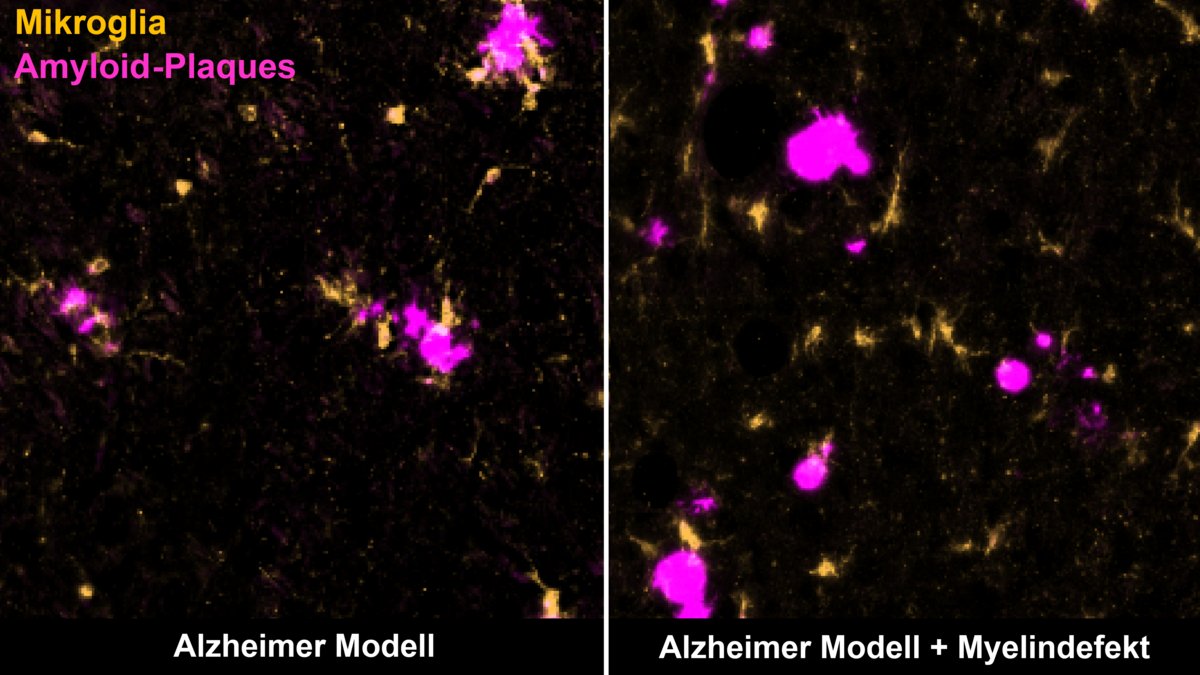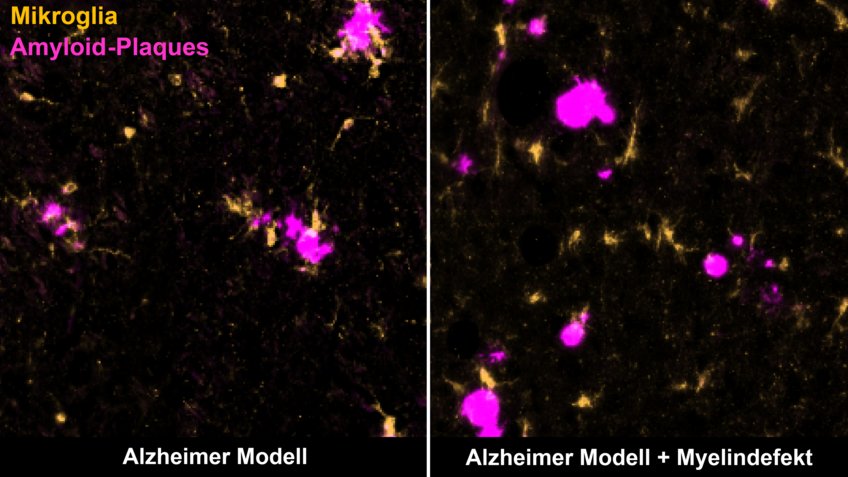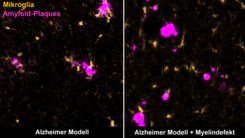
The researchers were able to show that defective myelin actively promotes disease-related changes in Alzheimer’s disease
Alzheimer’s disease is an irreversible form of dementia and is the most common neurodegenerative disease worldwide. The most important risk factor for this disease is age, although it is not yet clear why this is the case. The insulating layer around nerve cells in the brain, also known as myelin, is known to deteriorate with age. Researchers at the Max Planck Institute (MPI) for the interdisciplinary natural sciences in Göttingen have now been able to show that defective myelin actively promotes disease-related changes in Alzheimer’s disease. Slowing the rate of age-related myelin damage may open up new ways to prevent or delay the development of Alzheimer’s disease in the future.
© Max Planck Institute for Interdisciplinary Natural Sciences
Specific immune cells, microglia (yellow), clear amyloid plaques (purple) in the brain of a mouse with Alzheimer’s disease (left). Demyelination distracts them from it (right).
© Max Planck Institute for Interdisciplinary Natural Sciences
What was I about to do? Where do I put the key? When was the appointment again? It begins with slight memory loss, then follows increasing problems, to orient oneself, to follow conversations, to express oneself, to make simple movements. In the last stage, those affected usually require care. Alzheimer’s disease is a malignant disease that mostly affects the elderly. The risk of developing Alzheimer’s disease doubles every five years starting at age 65
Signs of aging in the brain
“The underlying mechanisms of the relationship between aging and Alzheimer’s disease have not yet been clarified,” explains Klaus Armin Naf, Director of the MPI Institute for Interdisciplinary Natural Sciences. with his oath Neurogenetic It looks at the function of myelin, the insulating, fat-rich layer of nerve fibers of nerve cells running in the brain. Myelin ensures rapid communication between nerve cells and supports metabolism. “Incorrect myelin is critical to normal brain function. We have been able to show that age-related changes in myelin promote pathological changes in Alzheimer’s disease,” Naff continues.
In a new study now published in the scientific journal Nature, researchers investigated the potential role of age-related deterioration of myelin in the development of Alzheimer’s disease. Her work focused on a typical feature of dementia: “A feature of Alzheimer’s disease is the deposition of certain proteins in the brain, the so-called amyloid-beta peptides or Aꞵ peptides for short,” explains Constance Dipp, one of the first authors of the study. Stady. “Aꞵ peptides clump together to form amyloid plaques. These plaques form in sufferers, many years or even decades before the first symptoms of Alzheimer’s appear.”
Using imaging and biochemical methods, the researchers examined and compared different mouse models of Alzheimer’s disease, in which amyloid plaques appear similar to those in Alzheimer’s patients. But for the first time, they examined Alzheimer’s mice, which also had myelin defects, such as those that also occur in the human brain with age.
Ting Sun, second author of the study, describes the results: “We saw that degradation of myelin accelerates deposition of amyloid plaques in the brains of mouse models with Alzheimer’s disease. Defective myelin puts stress on nerve fibers, causing them to swell and produce more Aꞵ peptides.”
Immune cells overwhelmed
At the same time, myelin defects attract the attention of the brain’s immune cells, microglia. These cells are highly alert and monitor the brain for any sign of weakness. It can absorb and destroy substances such as dead cells or cell components,” says Depp. Normally, microglia recognize amyloid plaques and clean them up, keeping the deposits in check. However, when microglia encounter both defective myelin and amyloid plaques, They primarily remove myelin remnants while allowing plaques to continue to accumulate.Researchers suspect that microglia are ‘dispersed’, or engulfed by myelin damage, and are therefore unable to respond properly to plaques.
The results of the study show for the first time that defective myelination in the aging brain increases the risk of deposition of Aꞵ peptides. Hopefully, this will also lead to new treatments. If age-related myelin damage can be slowed, it could also prevent or slow Alzheimer’s,” explains Naff.

